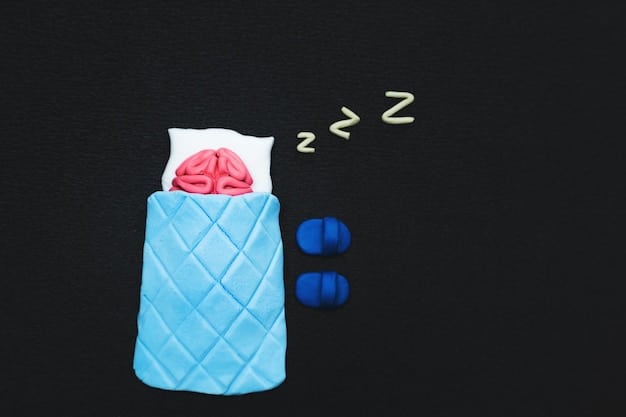The Link Between Sleep and Male Depression: A 7-Day Action Plan

The link between sleep deprivation and male depression is significant, with studies showing a clear correlation. This 7-day action plan offers practical steps to improve sleep and, consequently, alleviate symptoms of depression in men.
Many men experience the debilitating effects of depression, often compounded by a lack of quality sleep. Understanding the link between sleep deprivation and male depression is crucial for addressing both issues effectively. This article explores this connection and provides a practical 7-day action plan to improve sleep and mental well-being.
Exploring The Link Between Sleep Deprivation and Male Depression
Sleep deprivation can significantly impact mental health, particularly contributing to depression in men. This section delves into the underlying mechanisms and how insufficient sleep can exacerbate depressive symptoms.
The Science Behind Sleep and Mood
Studies have shown that sleep deprivation can disrupt neurotransmitter function in the brain.
- Serotonin and dopamine, crucial for mood regulation, are affected by poor sleep.
- Chronic sleep loss elevates cortisol levels, the stress hormone, further contributing to depressive symptoms.
- Brain areas responsible for emotional processing are impaired, leading to increased negativity and reduced emotional resilience.
These physiological changes underscore the importance of prioritizing sleep for better mental health.

Moreover, the link between sleep deprivation and male depression extends to daily functioning. Lack of sleep results in fatigue, difficulty concentrating, and impaired decision-making, exacerbating feelings of hopelessness and worthlessness often associated with depression. As a result, men may find themselves trapped in a cycle of poor sleep and worsening mental health.
In conclusion, understanding how insufficient sleep alters brain function and emotional processing is vital. By addressing sleep issues, men can take a significant step toward reducing depressive symptoms and improving their overall mental well-being.
Why Men Are Particularly Vulnerable
Men often face unique societal pressures that can increase their vulnerability to the link between sleep deprivation and male depression. This section examines these factors and sheds light on the specific challenges men may encounter.
Societal Expectations and Stigma
Traditional gender roles often discourage men from seeking help for mental health issues.
- Men are frequently expected to be strong and self-reliant, leading them to suppress their emotions and avoid seeking treatment.
- The stigma surrounding mental health in male-dominated environments, such as workplaces, can further deter men from disclosing their struggles.
- This reluctance to seek help can prolong their suffering and worsen the effects of sleep deprivation on their mental health.
Work-Related Stress and Sleep Patterns
High-pressure work environments contribute significantly to stress and poor sleep habits in men.
Long hours, demanding workloads, and job insecurity can lead to chronic stress, making it difficult to unwind and fall asleep. Irregular work schedules, such as shift work, can disrupt the body’s natural sleep-wake cycle, exacerbating sleep deprivation. As a result, men may experience heightened levels of anxiety and depression.

To address this problem, it’s essential to foster a culture that supports men’s mental health and promotes healthy sleep habits. Encouraging open communication, reducing workplace stigma, and prioritizing work-life balance can make a significant difference in improving men’s overall well-being. Recognizing and addressing these unique vulnerabilities are key to mitigating the link between sleep deprivation and male depression.
The 7-Day Action Plan: Reclaiming Your Sleep and Mood
This comprehensive 7-day action plan offers practical steps to improve sleep quality and alleviate symptoms of depression. Each day builds upon the previous, creating a sustainable routine.
Day 1: Assess Your Sleep Environment
Create a sleep-conducive environment by evaluating your bedroom.
- Ensure the room is dark, quiet, and cool. Use blackout curtains, earplugs, or a white noise machine if necessary.
- Invest in a comfortable mattress and pillow. Consider ergonomic options to support proper spinal alignment.
- Remove electronic devices such as televisions, smartphones, and tablets from the bedroom to minimize distractions.
Day 2: Establish a Consistent Sleep Schedule
Regulate your body’s natural sleep-wake cycle by setting a consistent sleep schedule.
Go to bed and wake up at the same time every day, even on weekends, to promote circadian rhythm stability. Avoid napping during the day, especially in the late afternoon, as it can interfere with nighttime sleepiness. If you must nap, keep it short (20-30 minutes) and before 3 PM.
Day 3: Optimize Your Pre-Sleep Routine
Develop a relaxing pre-sleep routine to prepare both your mind and body for rest.
Engage in calming activities such as reading a book, listening to soothing music, or practicing relaxation techniques like deep breathing. Avoid caffeine and alcohol close to bedtime, as they can disrupt sleep patterns. Take a warm bath or shower to relax your muscles and lower your body temperature.
Day 4: Incorporate Physical Activity
Regular physical activity can significantly improve sleep quality and mood.
Engage in at least 30 minutes of moderate-intensity exercise most days of the week, but avoid exercising too close to bedtime. Exercise can help reduce stress and anxiety, promoting deeper and more restful sleep. Consider activities such as jogging, swimming, or cycling.
Day 5: Manage Stress and Anxiety
Effective stress management techniques are essential because of the link between sleep deprivation and male depression.
Practice mindfulness meditation or guided imagery to reduce racing thoughts and promote relaxation. Consider seeking professional help from a therapist or counselor to address underlying stress and anxiety issues. Engage in hobbies and activities that bring you joy and a sense of accomplishment.
Day 6: Evaluate Your Diet
Certain dietary choices can impact sleep quality.
Avoid heavy meals and sugary snacks close to bedtime, as they can disrupt sleep patterns. Stay hydrated throughout the day, but limit fluid intake in the evening to minimize nighttime awakenings. Incorporate foods rich in melatonin, such as cherries, bananas, and walnuts, into your diet.
Day 7: Reflect and Adjust
Evaluate the impact of the action plan and make necessary adjustments.
Keep a sleep diary to track your sleep quality, mood, and any factors that may be affecting your sleep. Identify areas where you can improve your routine and make adjustments accordingly. Celebrate your progress and remain committed to prioritizing sleep for long-term mental well-being.
By implementing this 7-day action plan, men can take proactive steps to improve their sleep, reduce depressive symptoms, and enhance their overall quality of life. It’s important to remember that consistency and commitment are key to achieving lasting results.
Seeking Professional Help for Sleep and Depression
While this action plan can be a valuable starting point, seeking professional help is crucial for those experiencing persistent sleep problems or severe depression. A healthcare provider can offer tailored guidance and treatment options.
When to Consult a Doctor
It’s important to know when to seek professional help for sleep-related issues.
- If you experience persistent insomnia, excessive daytime sleepiness, or snoring, consult a doctor to rule out underlying medical conditions such as sleep apnea.
- If your sleep problems are accompanied by symptoms of depression, such as persistent sadness, loss of interest in activities, or suicidal thoughts, seek professional help immediately.
- A healthcare provider can conduct a thorough evaluation and recommend appropriate treatment options.
Therapy and Counseling
Therapy and counseling can be effective treatments for depression and associated sleep problems.
Cognitive Behavioral Therapy for Insomnia (CBT-I) can help individuals identify and change negative thoughts and behaviors that contribute to sleep difficulties. Psychotherapy can address underlying emotional issues that may be contributing to depression. Support groups can provide a safe and supportive environment for men to share their experiences and learn coping strategies.
Combining lifestyle changes with professional support can lead to significant improvements in both sleep and mental health. Don’t hesitate to seek help when needed.
Long-Term Strategies for Sustainable Sleep and Mental Health
Creating sustainable habits is essential for maintaining long-term sleep and mental health benefits. This section provides ongoing strategies to support your well-being.
Maintaining a Consistent Routine
Consistency is key to regulating your body’s natural sleep-wake cycle.
Continue to prioritize a regular sleep schedule, even on weekends and holidays. Stick to your pre-sleep routine and avoid disrupting activities that can interfere with sleep. Be mindful of your sleep environment and adjust it as needed to maintain optimal conditions.
Mindfulness and Relaxation Techniques
Incorporate relaxation techniques into your daily routine to manage stress and promote relaxation.
Practice mindfulness meditation or deep breathing exercises for a few minutes each day to reduce stress and anxiety. Engage in activities that bring you joy and a sense of accomplishment, such as hobbies, spending time in nature, or connecting with loved ones. Prioritize self-care activities to support your overall well-being.
The Importance of Social Connection
Maintaining strong social connections can buffer stress and promote overall mental health.
Spend quality time with friends and family members who provide support and encouragement. Engage in social activities and community events to foster a sense of belonging and connection. Consider joining a support group or men’s mental health organization to connect with others who understand your struggles and because they have also investigated the link between sleep deprivation and male depression.
By adopting these long-term strategies, men can sustain the positive effects of improved sleep and mental health, leading to a more fulfilling and balanced life.
| Key Point | Brief Description |
|---|---|
| 😴Consistent Sleep Schedule | Go to bed and wake up at the same time daily. |
| 🧘Stress Management | Practice mindfulness and relaxation techniques. |
| 💪Regular Exercise | Engage in physical activity most days. |
| 🧑⚕️Professional Help | Seek therapy if sleep or depression persists. |
Frequently Asked Questions
Sleep deprivation can disrupt neurotransmitters like serotonin and dopamine, leading to mood imbalances and increased depression, according to some papers on the link between sleep deprivation and male depression.
Establishing a regular sleep schedule helps regulate your body’s natural sleep-wake cycle, promoting better hormone balance and reducing stress, thus improving mental health.
Yes, regular physical activity can reduce stress and anxiety, promoting deeper, more restful sleep while also boosting mood-enhancing chemicals in the brain.
Avoiding heavy meals and sugary snacks before bed, staying hydrated, and incorporating melatonin-rich foods like cherries and bananas can improve sleep quality.
If you experience persistent insomnia, daytime sleepiness, or symptoms of depression, like persistent sadness or loss of interest, consult a doctor to rule out underlying conditions.
Conclusion
Understanding the link between sleep deprivation and male depression is essential for addressing both issues effectively. This 7-day action plan provides a practical roadmap for improving sleep quality and, consequently, alleviating depressive symptoms.





